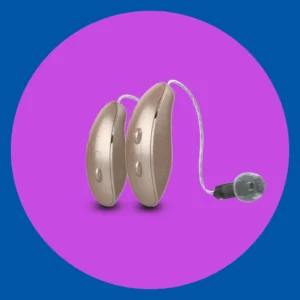Can Hearing Aids Help With Tinnitus? How?
If you are wondering can hearing aids help with tinnitus, you are not alone. Many people with tinnitus also have some degree of hearing loss, and hearing aids can play a role in managing both. The answer is not always simple, but the connection between hearing aids and tinnitus relief is well worth exploring.
This guide will help you understand tinnitus, how hearing aids work, what research says about their benefits for tinnitus relief, and how to take your next steps toward better hearing health.
Understanding Tinnitus
Tinnitus is not a disease but a symptom. It occurs when you hear sounds that are not coming from an external source. These phantom sounds can be high-pitched or low-pitched and may come and go or remain constant.
Common causes and triggers include:
- Age-related hearing loss.
- Exposure to loud noise over time.
- Ear infections or earwax buildup.
- Certain medications that affect hearing.
- Head or neck injuries.
Tinnitus can have a significant emotional and physical impact. Many people experience difficulty sleeping, trouble concentrating, and feelings of anxiety or stress.
For more insight into strategies for managing tinnitus, read How to Address Tinnitus.
How Hearing Aids Work
To understand how hearing aids can help tinnitus, it helps to know how they function. Hearing aids are small devices that pick up sounds from the environment and make them louder and clearer. Modern hearing aids also process sound to reduce background noise and focus on speech.
By improving access to environmental sounds, hearing aids can reduce the contrast between your tinnitus and the world around you. For those with hearing loss, this can mean less focus on internal ringing and more focus on real-world sounds.
If you have other symptoms of hearing loss along with tinnitus, review the common Hearing Loss Symptoms to see if you might benefit from a hearing test.
How Hearing Aids Can Help With Tinnitus
For many people, tinnitus becomes most noticeable in quiet settings. If you cannot hear well, your brain receives less sound input. This lack of sound can make tinnitus seem louder and more intrusive. Hearing aids can help in several ways:
Masking Tinnitus With External Sounds
Amplifying environmental sounds makes tinnitus less noticeable. Everyday noises like soft conversation, distant traffic, or nature sounds can partially cover the ringing or buzzing.
Improving Brain Sound Processing
Hearing aids give the brain more accurate sound information. This can reduce the brain’s tendency to generate phantom noises to fill the silence.
Reducing Listening Effort
When you have untreated hearing loss, your brain works harder to process sound. This extra effort can increase stress and make tinnitus more noticeable. Hearing aids can reduce listening fatigue and help you feel more relaxed.
Supporting Emotional Well-being
Tinnitus often triggers feelings of frustration and anxiety. Better hearing can improve communication, which may help reduce these emotional effects over time.

What the Research Says
Several studies have explored the question: can hearing aids help with tinnitus? While not every tinnitus sufferer experiences complete relief, research shows that many do report improvement.
Tinnitus Relief Through Amplification
The study published in the International Journal of Audiology examined tinnitus patients fitted with hearing aids. Researchers found that most participants reported a reduction in tinnitus loudness and annoyance after consistent hearing aid use. The study concluded that hearing aids are a valid management option for those with both hearing loss and tinnitus.
Combining Sound Therapy With Amplification
A recent Frontiers in Audiology and Otology study found that hearing aids equipped with tinnitus masking features could provide even greater relief. Participants used both amplification and integrated sound therapy. The results showed significant improvement in tinnitus perception and reduced stress levels after several weeks of use.
Review of Evidence
A systematic review in the National Library of Medicine analyzed multiple studies on hearing aids and tinnitus. The review found consistent evidence that hearing aids improve tinnitus symptoms for many individuals, especially when hearing loss is present. However, it noted that results can vary depending on the cause of tinnitus and individual hearing needs.
Types of Hearing Aids That May Help Most
Not every hearing aid is equally suited for tinnitus relief. Some styles and technologies offer better results than others.
- Behind-the-Ear (BTE): Powerful amplification and compatibility with tinnitus masking programs.
- Receiver-in-Canal (RIC): Comfortable fit, excellent sound quality, and advanced processing options.
- Custom In-Ear Models: Discreet and may include tinnitus relief features, though space for advanced options is sometimes limited.
If you want to explore the latest technology designed for both hearing loss and tinnitus, read Top Hearing Aids for Sale.

Extra Features for Tinnitus Relief
Today’s hearing aids offer advanced features that can help manage tinnitus symptoms:
- Built-in Masking Sounds: Soft noise or nature sounds can blend with your tinnitus.
- Bluetooth Streaming: Connect to your phone or tablet for streaming sound therapy apps.
- Customizable Programs: Adjust masking sounds or amplification settings for different environments.
These features give you more control over your tinnitus management and allow for a more personalized approach.
When Hearing Aids May Not Fully Help
While many people benefit from hearing aids, they are not a universal cure for tinnitus. Situations where hearing aids may not provide full relief include:
- Tinnitus without measurable hearing loss.
- Tinnitus caused by underlying medical conditions such as TMJ disorders or vascular issues.
- Tinnitus from sudden injury or medication side effects that require medical attention.
In these cases, hearing aids may still help indirectly by improving hearing clarity, but they should be part of a broader treatment plan.
Steps to Take Before Trying Hearing Aids
If you think hearing aids might help your tinnitus, take these steps first:
- Get a Comprehensive Hearing Test
Visit a provider for a full evaluation. (In Sioux Falls? We can help. Free Hearing Test in Sioux Falls.) - Discuss Your Tinnitus Symptoms
Explain when you notice your tinnitus, what it sounds like, and how it affects your life. - Set Realistic Expectations
Understand that relief is possible, but it may take time and adjustments to find the right settings. - Consider Combining Treatments
Use hearing aids along with relaxation techniques, sound therapy, and healthy lifestyle changes.
Practical Tips for Living With Tinnitus and Hearing Aids
Living with tinnitus takes patience and consistency. Here are ways to maximize your relief:
- Use Sound Enrichment Daily
Play soft background music, nature sounds, or white noise during quiet times. - Avoid Complete Silence
Background sound helps mask tinnitus and reduces focus on the ringing. - Wear Your Hearing Aids Consistently
Daily use allows your brain to adjust and helps maintain relief. - Stay Active and Social
Engage in activities that distract your mind and bring enjoyment. - Work Closely With Your Provider
Regular follow-ups ensure your hearing aids remain optimized for your needs.

Your Next Step Toward Tinnitus Relief
Tinnitus can make life more difficult, but it does not have to take control. For many people with hearing loss, hearing aids provide meaningful relief by masking tinnitus, improving hearing clarity, and reducing listening effort. Research supports their role as part of a comprehensive tinnitus management plan.
If you are ready to explore whether hearing aids can help with your tinnitus, schedule a consultation with Stanford Hearing today. Our team can assess your hearing, discuss your symptoms, and recommend solutions tailored to you.
Contact Stanford Hearing to start your journey toward clearer hearing and a calmer mind.
